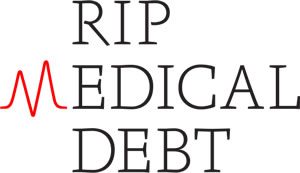
By Lindsay Street, Statehouse correspondent | More than one in three South Carolinians have past-due medical bills, according to the Urban Institute. While state lawmakers mull a bill that could provide some relief — with some still unclear on a path forward — a national nonprofit is seeking S.C. donors to help alleviate the crushing load for the Palmetto State’s poorest residents.

“That’s our responsibility as believers to administer God’s love to the less fortunate,” Tom Ervin of Greenville told Statehouse Report. Ervin, who represents the Upstate on the state’s utility regulatory commission, and his wife Kathryn Williams recently donated $15,000 to RIP Medical Debt. The money purchased more than $1.5 million in medical debt in the Upstate for more than 1,000 people.
How is that possible? The national nonprofit purchases overdue debt directly from collectors and hospitals for pennies on the dollar — debts are often sold at steep discounts to investors and collectors — and works directly with the credit reporting agency Transunion to identify those most in need.
So far, RIP Medical Debt has helped eliminate nearly $4 million in medical debt in South Carolina. Since the nonprofit’s 2014 founding, it is poised to reach $900 million in debt relief this month, a founder said.
RIP Medical Debt has identified about $16.8 million in medical debt remaining among those South Carolinians earning less than twice the federal poverty level (roughly less than $50,000 a year for a family of four) or those whose hardship is a significant portion of their yearly income.
According to an Urban Institute report, South Carolina is among the five worst states for prevalence of medical debt with 32.4 percent of nonelderly adults reporting past-due medical debt. Many of those adults have insurance coverage. Medical bills are the largest drivers of bankruptcy and debt in South Carolina, according to the report.
Soon, those benefiting from the Ervin-Williams donation will receive a yellow envelope. Inside, they will find out that the debt that they were likely unable to repay has been paid in full and cleared from their credit history.
“Every single one of them never in their lifetime could they have paid that bill off and they shouldn’t have been billed to begin with,” RIP Director of Education and Outreach Jerry Ashton of New York City told Statehouse Report. Ashton is a former medical debt collector, one of two to found the nonprofit.
Ervin and Williams are both attorneys who, Ervin said, have witnessed “the impact of excessive medical debt.” They saw a recent, national story on RIP Medical Debt, and they wanted to bring relief to their neighbors.
“It’s sad to see how many people are struggling in our country even though the economy is doing good. A lot of people are living paycheck to paycheck,” said Ervin, a member of the S.C. Public Service Commission. That many people suffering from medical debt with health insurance, he said, shows “how broken our system is.”
Ervin and Williams said they hope their donation will create a cascade of efforts in the Lowcountry and Midlands to help clear the state’s medical debt load.
Abolishing debt effort in. SC.
There are several campaigns active via RIP Medical Debt that are ongoing in South Carolina. Ervin said the campaign he is pushing will focus on Lowcountry donors in the next 30 days, then move on to campaigning in the Midlands.
“Our hope is that we will have the entire state caught up on unpaid medical debt,” Ervin said.
 Another campaign is being run by direct primary care doctors in North Carolina and South Carolina, according to RIP Development Associate Leo Fines. It seeks to eliminate $2 million in medical debt in both states. A separate campaign, which begins in October, is being run by health care policy analyst Jordan Roberts of the John Locke Foundation.
Another campaign is being run by direct primary care doctors in North Carolina and South Carolina, according to RIP Development Associate Leo Fines. It seeks to eliminate $2 million in medical debt in both states. A separate campaign, which begins in October, is being run by health care policy analyst Jordan Roberts of the John Locke Foundation.
- For more information ongoing South Carolina campaigns, visit the nonprofit’s website, ripmedicaldebt.org.
But even if all of South Carolina’s current medical debt was abolished overnight, it will slowly tick back up into the millions if the root problems aren’t addressed, Ashton said.
“It’s about making laws and regulations that are more humane as opposed to profit-centered,” he said.
Seizure issue may be first tackled
Though lawmakers know medical debt is an issue, there is only one bill filed for the 2019-2020 session that could potentially help.

S.C. House Bill 3117 was filed by Bluffton Republican Rep. Bill Herbkersman earlier this year. The bill is not specific to medical debt, but it would curb a state law that allows hospitals to seize tax returns through the S.C. Department of Revenue.
In 2017, health organizations in South Carolina made more than 172,000 seizures of at least $92.9 million to pay off past-due medical bills, according to a review by The Post and Courier. The law allowing those seizures was intended to allow municipalities and other local governments to seize tax returns for unpaid fees. But it also allows semi-public health centers to do the same for medical services.
Herbkersman said that while his bill isn’t necessarily focused on medical debt, “it’s a good conversation to have.”
Orangeburg Democratic Sen. Brad Hutto is working with advocates in the state on the issue of medical debt, but nothing has been drafted as of yet, he said. S.C. House Medical, Military, Public and Municipal Affairs Committee Chairman Leon Howard called the issue of medical debt “a big one.”
“I’m still giving a lot of thought over how we are going to get our arms around that,” he said this week. “We got to do something because it’s unbearable.”
The Urban Institute identified the following recommendations for lawmakers:
- Expand access to health insurance coverage. South Carolina is one of 14 states that has not expanded Medicaid access, which has been linked to hundreds of deaths in the state.
- Offer protections from “surprise” medical bills, which arise when an insured person inadvertently receives care from an out-of-network provider. South Carolina is one of 25 states that does not offer protections from such expenses. There is a bill in front of the U.S. Senate, S. 1531, that seeks to curb surprise medical bills.
- Have a comment? Send to: feedback@statehousereport.com


